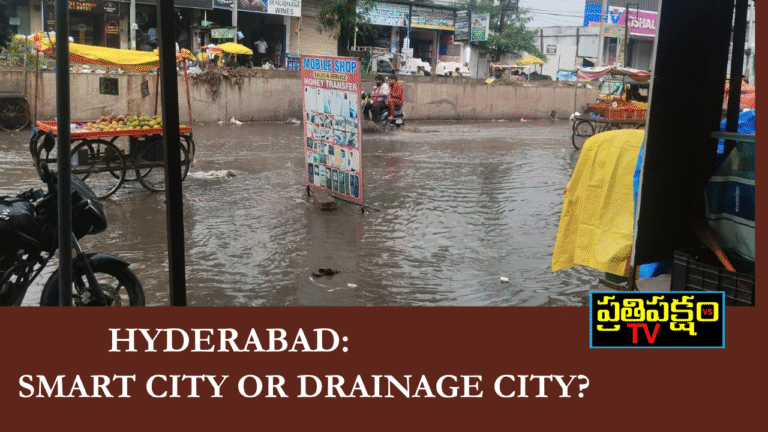Editorial Analysis by Veeramusti Sathish
A brief spell of rain in Hyderabad has once again exposed the city’s fragile drainage system. Within minutes of a light shower, main roads in Gudimalkapur, Karwan, and Jiyaguda turned into mini canals, with drainage water flooding the streets, forcing pedestrians to wade through dirty, foul-smelling water.
This is not an isolated incident. Every year, the same areas face the same nightmare — water stagnation, overflowing manholes, and flooded markets. The photo above, taken after just a few minutes of rain, tells the story of urban negligence and civic failure.
Smart City or Sewer City?
Chief Minister A. Revanth Reddy has often spoken about transforming Hyderabad into a “Future Smart City.” But before dreaming about high-tech towers and metro corridors, the government must focus on basic civic needs — proper drainage, clean roads, and functional sanitation.
A smart city cannot exist when people must lift their trousers and walk through drain water mixed with garbage. The same GHMC (Greater Hyderabad Municipal Corporation) which promises modernization, fails to maintain even basic stormwater drains.
Reality Check: Gudimalkapur to Jiyaguda
Gudimalkapur Market: Overflowing drainage water flows onto the main road, mixing with vegetable waste, creating a breeding ground for mosquitoes.
Karwan Junction: Pedestrians struggle to cross roads; two-wheelers skid frequently on muddy stretches.
Jiyaguda Area: Residents say they’ve been complaining for years, but civic officials visit only before elections.
The Karwan–Jiyaguda–Mehdipatnam stretch is one of Hyderabad’s busiest localities, housing thousands of middle-class families, small vendors, and workers. Yet, the infrastructure here reflects utter neglect.
Drainage Failure = Public Health Hazard
This is not just about inconvenience — it’s a public health issue. Drainage water mixing with rainwater carries bacteria, sewage, and chemicals. It increases risks of cholera, dengue, and skin infections, especially among children.
With every rainfall, the urban poor pay the price — lost workdays, damaged goods, and constant fear of infections. Ironically, the same government that spends crores on flyovers and beautification projects ignores the drainage below the surface.
Who Is Responsible?
Civic apathy is a collective failure:
GHMC blames heavy rainfall and lack of funds.
Local MLAs and Corporators blame bureaucrats.
The Water Board claims outdated drainage lines can’t handle today’s load.
But none can deny that systematic negligence is the real reason. Funds are sanctioned every year for stormwater projects, yet the execution stops after paper tenders.
Even residents raise an important question:
“If this is the condition after a 20-minute rain, what happens during heavy monsoon?”
Revanth Reddy’s Government – Promises vs. Performance
When Revanth Reddy took charge, he promised transparent governance and city rejuvenation. However, people in old Hyderabad say they have seen zero improvement in ground-level infrastructure.
Smart City slogans are not enough; what’s needed is Smart Administration. Drainage maps must be digitalized, real-time flood sensors must be installed, and GHMC must be accountable to citizens.
The Forgotten Corners of Hyderabad
Areas like Karwan, Gudimalkapur, Jiyaguda, Ziaguda, and Mehdipatnam are densely populated but often excluded from development plans. These are not “elite zones” — no skyscrapers, no IT hubs, just hardworking people struggling for basic civic dignity.
If Hyderabad is truly to be a “Global City,” development must begin from the bottom-up, not the top-down. Start by rebuilding these ignored neighborhoods, then talk of smart sensors and AI-driven city models.
Citizen Voices
“Every year we complain. GHMC repairs drains before inspection, then forgets us,”
says Mohammed Shafi, a shop owner in Gudimalkapur.
“The stinking water enters our homes. Children fall sick. What Smart City is this?”
asks Ramesh, a resident of Jiyaguda.
These voices represent the silent frustration of millions of citizens who pay taxes but get sewage in return.

